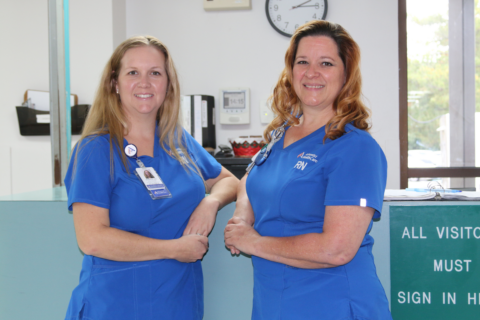Many people focus on health and wellness in the new year. But with January in the rearview mirror, those 2023 goals and resolutions may already have fallen by the wayside.
As part of WTOP’s Get on Top of Your Health series, we sat down with two doctors from Adventist Medical Group at Adventist HealthCare Fort Washington Medical Center to talk about health goals: Dr. Ogechi Anyaoku, an internal medicine physician, and Dr. Tuesday Cook, a board-certified, minimally invasive and bariatric surgeon.
They shared how to tackle health and wellness goals without losing hope, and why working with a medical team makes a critical difference in success.
Health goals for 2023
“There is no cookie cutter approach to wellness. Everyone is an individual when it comes to achieving manageable goals or resolutions,” Anyaoku said.
It’s also important to make goals that are specific and to ramp up reasonably to be successful, she said. She used the example of drinking more water, which she called an admirable health goal.
“If I drink zero glasses of water a day today, and I want to drink 10 glasses of water, maybe over the next three months, I’ll drink three glasses of water a day. And then the next three months after that, six glasses of water and then at the end of the year, I’ll be drinking 10 glasses of water,” Anyaoku said.
The same personalized steps work for diet and exercise too, she said.
Losing weight
Where to begin?
The doctors suggest starting with a healthy diet, nutritional changes such as decreasing sugar and carbohydrate intake, and behavior modification including exercise.
But Cook said this can be a daunting task for some people, riddled with obstacles. Plus, some factors are not within people’s control.
“Obesity is a multifactorial disease which can stem from genetics or your environment. It stems from the kinds of foods that you have access to, and it matters what your hormones are. Medications can play a role as well,” she said.
Anyaoku added that some people might not have access to good health care or even access to grocery stores to buy healthy foods. Others might have a family history of disease.
Often, people with high weight think it’s their fault — that they just need more willpower. In reality, it’s not them, Cook said. “They need help” and possibly even surgery.
Who can benefit from bariatric surgery?
Cook recommended starting with a phone call to a surgeon’s office. At Adventist HealthCare Fort Washington Medical Center, a team of doctors and practitioners will help decide whether someone is a good candidate for a bariatric procedure or other metabolic interventions.
What’s more, they can help determine whether someone’s insurance covers the care. Many insurance plans do, and people often are surprised by that, Cook said.
If cleared for the procedure, which involves reducing the size of the stomach through minimally invasive surgical techniques, patients are generally excited, Cook said. And that’s not only about the weight loss but also about the other potential health and wellness outcomes.
“Bariatric surgery helps with pre-diabetes and resolution of Type 2 diabetes,” she said. In fact, 92% of patients see their Type 2 diabetes go into remission following the surgery, Cook said.
“Same thing with hypertension,” she said. “We have about 85% of patients that get resolution or improvement of their hypertension. Sixty percent have improvement or decreased risk of developing cancers or recurrence.”
Roughly 40 medical conditions associated with high weight can be improved with bariatric surgery, including sleep apnea, high cholesterol, osteoarthritis and infertility.
Weight loss surgery and daily activities
“Changing your stomach and small intestines and the anatomy helps you to have a change in your appetite, eat less and be less hungry,” Cook said.
Plus, achieving the proper weight can also have a huge impact on emotional and mental health, as well as how a patient performs daily tasks.
“Now they can bend over and tie their shoes. They can walk to the mailbox and back without getting short of breath. They can get on the floor and play with their kids and their grandkids,” Cook said.
Continuity of care at Adventist Fort Washington
Care at Adventist HealthCare Fort Washington Medical Center doesn’t end after someone leaves the hospital, typically a day or two after the procedure.
“When I see a patient initially, I let them know that they cannot disappear,” Cook said with a laugh. A nutritionist follows patients from pre-op to post-op and beyond. The full team includes the surgeon, a nurse practitioner, a medical assistant who’s also a patient navigator, exercise physiologists and behavioral health therapists who can address a patient’s relationship with food.
Cook said she typically sees patients at three to five days after surgery, then again at three weeks, three months, six months, nine months and a year, and then every year thereafter.
Importance of doctor-patient relationship
To help reach those 2023 goals, Anyaoku said it’s important to begin with a conversation with a primary care doctor.
“We can help identify problems before they become major issues. For example, diabetes or even high blood pressure. We can also keep you up to date on your vaccinations and cancer screenings and help you manage these issues and delay the progress of these diseases,” she said.
“Rely on your team of providers to support you through the process because we are truly invested in your success.”
To learn more about these and other health services, visit the Adventist Fort Washington Medical Center website. And to discover additional tips and tactics to get on top of your health, click here.







